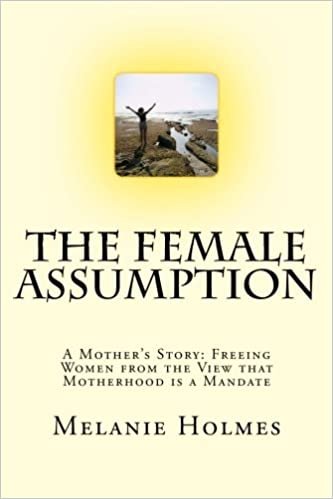Book Review: The Female Assumption
The Female Assumption. Melanie Holmes. CreateSpace, October 2, 2014. Trade Paperback and Kindle, 204 pages.
Reviewed by Serena Wadhwa.
When I was approached to review this book, I was in the midst of several projects with fast-approaching deadlines, some hard decisions I was making, and the holidays. As I read the synopsis for the book, I was intrigued. Being a woman, and one who comes from a culture with traditional beliefs about women’s roles, I inquired if an extension was possible so I could complete the review. It was granted and not only was I glad I made that request, I am grateful to Melanie Holmes for bringing a much-needed topic to the surface.
“Despite all the advances for women in the last few decades, we still, as a society assume motherhood is the ultimate goal for females. Without realizing that perhaps not all females will want to, should, or be able to become moms, the message that the majority of females still hear is that motherhood is integral to a well-rounded life.”
This book seeks to provide balance when it comes to understanding the joys and burdens of this message—literally, metaphorically, psychologically, physically, financially, spiritually/religiously, and in so many other ways. Women, from a very early age, are ingrained with this notion that motherhood is the only goal worth pursuing and possibly worth their existence. Holmes gently and firmly presents the reader with information, from both a factual and an anecdotal perspective, that motherhood is not the only goal worth pursuing and the only source of identity.
Holmes makes clear that what she presents is her opinion and desire, coming from wanting women to make informed decisions. She states, “Virginia Woolf wrote, ‘When a subject is highly controversial, one cannot hope to tell the truth. One can only show how one came to hold whatever opinion one does hold.’ This is what I plan to do.” I do believe in order for anyone to minimize negative emotions, informed decisions may go a long way in this. When we see all the facts, fears, emotions and options, we know with a full heart and mind what we are mapping.
Holmes explores the concept of Motherhood Catechism, a term she learned in a sociology class and how this relates to the all-inclusive and exclusive assumption about females and motherhood. She explores the societal, cultural, religious, and family expectations, both spoken and unspoken, cementing many women’s beliefs in the inevitability of becoming a mother, despite the lack of passion or desire to be one (in the “traditional” sense of the word). And how this lack of passion or desire for wanting to become a mother is “wrong,” when in reality, it is normal.
As a woman, I related to much of what Holmes wrote about. And having female friends, with and without children, we often discuss these “assumptions.” As a clinician, I witness the struggles my female clients go through in facing similar issues. The proverbial “how many kids do you have,” implying every woman has kids; “when are you going to have kids?” implying every woman wants to; and the treatment when women declare being “child-free” (as opposed to being “child-less”, which implies a less-than status, according to Holmes), are a few of the oppressive and invalidating comments many individuals make. Here again is a diversity factor we as a culture and society fail to accept.
I like the fact that Holmes challenges the reader to ask the questions about what makes parenthood so special. Why does someone want to become a parent or have kids? Holmes offers several challenges to the traditional avenue of motherhood, for example, to judge motherhood as the most rewarding, most heartbreaking, etc. Because exactly how do we judge what’s intrinsically rewarding? How do you measure that?
Holmes also explores some of the realities of motherhood often not discussed or written about, like the reality of how your agenda doesn’t matter. And finances. And maybe that shirt you really like. And sleep. And how there IS no book on motherhood. She also explores the double standards existing for males and females in the workspace. And while some cultural factors are brought into the narrative, these are minimal. I recognize this reflects what Holmes wanted to focus on; however, as a minority, I did want to read more about those experiences.
Overall, I enjoyed the book. It provided a review of how society tends to brainwash inhabitants to believe one thing and protect it at all costs, when in reality, there are many individuals that live otherwise. Like The Matrix, some individuals are living and loving their own reality—without children.

